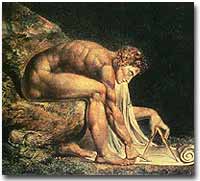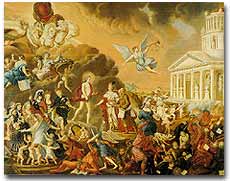How Did The Enlightenment Change The World

7a. The Impact of Enlightenment in Europe

Blake
Blake's representation of Newton.
The Age of Reason, as information technology was called, was spreading rapidly across Europe. In the late 17th century, scientists like Isaac Newton and writers like John Locke were challenging the old gild. Newton'southward laws of gravity and motion described the world in terms of natural laws across any spiritual forcefulness. In the wake of political turmoil in England, Locke asserted the right of a people to modify a regime that did not protect natural rights of life, freedom and holding. People were starting time to doubt the existence of a God who could predestine human beings to eternal damnation and empower a tyrant for a king. Europe would be forever changed past these ideas.

In America, intellectuals were reading these ideas also. On their side of the Atlantic, Enlightened ideas of freedom and progress had a adventure to flourish without the shackles of Erstwhile Europe. Religious leaders began to change their old dogmatic positions. They began to emphasize the similarities between the Anglican Church and the Puritan Congregationalists rather than the differences. Fifty-fifty Cotton Mather, the Massachusetts minister who wrote and spoke so convincingly well-nigh the existence of witches advocated science to immunize citizens against smallpox. Harvard ministers became so liberal that Yale College was founded in New Haven in 1707 in an try to retain one-time Calvinist ideas. This attempt failed and the entire faculty except one converted to the Church of England in 1722. Past the end of the century, many New England ministers would become Unitarians, doubting even the divinity of Christ.

painting past Duplessis
Triomphe de Voltaire
New ideas shaped political attitudes besides. John Locke defended the displacement of a monarch who would non protect the lives, liberties, and property of the English people. Jean-Jacques Rousseau stated that guild should be ruled by the "general will" of the people. Baron de Montesquieu declared that power should non exist concentrated in the hands of whatsoever one individual. He recommended separating power among executive, legislative, judicial branches of authorities. American intellectuals began to absorb these ideas. The delegates who declared independence from Britain used many of these arguments. The unabridged opening of the Declaration of Independence is Thomas Jefferson's application of John Locke's ideas. The constitutions of our starting time states and the Us Constitution reflect Enlightenment principles. The writings of Benjamin Franklin made many Enlightenment ideas accessible to the general public.
The old way of life was represented by superstition, an angry God, and accented submission to dominance. The thinkers of the Historic period of Reason ushered in a new way of thinking. This new manner championed the accomplishments of humankind. Individuals did non have to take despair. Science and reason could bring happiness and progress. Kings did not rule by divine right. They had an obligation to their subjects. Europeans pondered the implications for nearly a century. Americans put them into practise commencement.
![]()
If you like our content, delight share information technology on social media!

![]()
Source: https://www.ushistory.org/us/7a.asp
Posted by: xiongbefornes.blogspot.com


0 Response to "How Did The Enlightenment Change The World"
Post a Comment